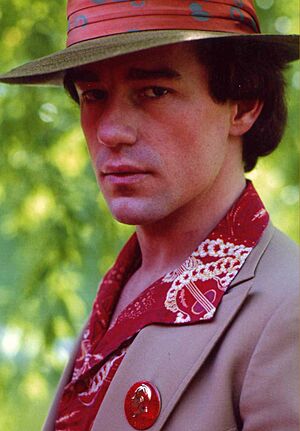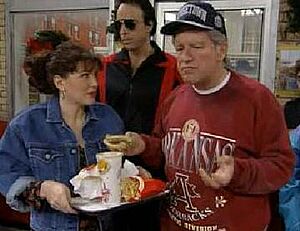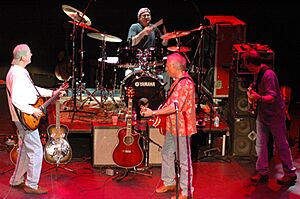Phil Hartman facts for kids
Quick facts for kids
Phil Hartman
|
|
|---|---|

Hartman as Chick Hazard, Private Eye, around 1978.
|
|
| Born |
Philip Edward Hartmann
September 24, 1948 Brantford, Ontario, Canada
|
| Died | May 28, 1998 (aged 49) Los Angeles, California, U.S.
|
| Cause of death | Murder by gunshot |
| Resting place | Cremated; Ashes scattered over Emerald Bay, Santa Catalina Island, California, U.S. |
| Citizenship |
|
| Alma mater | California State University, Northridge (BA) |
| Occupation |
|
| Years active | 1969–1998 |
| Television | Saturday Night Live |
| Spouse(s) |
|
| Children | 2 |
Philip Edward Hartman (born Hartmann; September 24, 1948 – May 28, 1998) was a talented Canadian-American comedian, actor, writer, and graphic designer. He was born in Brantford, Ontario, Canada. His family moved to the United States when he was ten years old.
After studying graphic arts at California State University, Northridge, Phil designed album covers for popular bands like Poco and America. In 1975, he joined a comedy group called The Groundlings. There, he helped Paul Reubens create the famous character Pee-wee Herman. Phil also co-wrote the movie Pee-wee's Big Adventure and played Captain Carl on the TV show Pee-wee's Playhouse.
In 1986, Phil joined the cast of the popular TV show Saturday Night Live (SNL). He stayed for eight seasons until 1994. His fellow cast members called him "Glue" because he was so good at holding the show together. He also helped other actors. For his work on SNL, he won an Primetime Emmy Award in 1989.
Phil also starred as Bill McNeal in the TV show NewsRadio. He voiced two well-known characters, Lionel Hutz and Troy McClure, on The Simpsons. He also appeared in movies like Houseguest, Sgt. Bilko, Jingle All the Way, and Small Soldiers.
Phil Hartman was known as a kind and regular person. Many people he worked with loved him. Sadly, Phil passed away in 1998. After his death, many tributes celebrated his life and work. He was honored by being added to both Canada's Walk of Fame in 2012 and the Hollywood Walk of Fame in 2014.
Contents
Early Life and Art Career
Phil Hartman was born Philip Edward Hartmann on September 24, 1948, in Brantford, Ontario. He was one of eight children. His family moved to the United States when he was ten years old. They lived in different places, including Lewiston, Maine, and Meriden, Connecticut. Later, they settled on the West Coast.
As a child, Phil was often the class clown at Westchester High School. After high school, he studied art at Santa Monica City College. In 1969, he took a break to work as a roadie for a rock band. He returned to school in 1972 to study graphic arts at California State University, Northridge.
Phil started his own graphic art business. He designed more than 40 album covers for bands like Poco and America. He also created advertising and the logo for Crosby, Stills & Nash. In the late 1970s, he appeared on a TV show called The Dating Game and won!
Comedy and Acting Career
Starting with The Groundlings and Pee-wee Herman
In 1975, Phil Hartman joined The Groundlings, an improvisational comedy group in California. He loved performing and quickly became one of their stars by 1979.
At The Groundlings, Phil became good friends with Paul Reubens. They worked together to create the character Pee-wee Herman. They developed The Pee-wee Herman Show, which was a live stage show. It later aired on HBO in 1981. Phil played Captain Carl in the show. He continued this role in the children's TV show Pee-wee's Playhouse.
Phil also helped write the script for the 1985 movie Pee-wee's Big Adventure. He had a small role as a reporter in the film. The success of this movie encouraged him to continue acting.
Voice Acting and Early Film Roles
Before joining Saturday Night Live, Phil Hartman took on small roles in movies. These included Jumpin' Jack Flash and Three Amigos in 1986.
He also became a busy voice actor for animated TV shows. He lent his voice to characters in The Smurfs, Challenge of the GoBots, and The 13 Ghosts of Scooby-Doo. In Dennis the Menace, he voiced Henry Mitchell and George Wilson. Phil was also known for his voice-overs in many advertisements.
Becoming a Star on Saturday Night Live (1986–1994)
Phil Hartman joined NBC's Saturday Night Live (SNL) in 1986. He was recommended by other Groundlings members who were already on the show. Phil wanted to join SNL to become more well-known. This would help him write movies for himself.
During his eight seasons on SNL, Phil became famous for his impressions. He played over 70 different characters. Some of his original characters included Eugene and Unfrozen Caveman Lawyer. His impressions included Frank Sinatra, Ronald Reagan, Ed McMahon, and Barbara Bush. His impression of Bill Clinton was considered his best.

Phil first performed his Clinton impression on The Tonight Show. When he met President Clinton in 1993, Phil joked about his impression. Clinton was a good sport and sent Phil a signed photo. It said, "You're not the president, but you play one on TV. And you're OK, mostly." Phil studied Clinton's voice and gestures to make his impression perfect.
On SNL, Phil was nicknamed "Glue" by his castmates. This was because he helped hold the show together. He was very supportive of other cast members. SNL creator Lorne Michaels said Phil was "the least appreciated" cast member by people outside the show. He praised Phil's ability to play many different roles in one show. In 1989, Phil won an Primetime Emmy Award for his writing on SNL.
By 1993, most of the cast members who started with Phil had left SNL. Phil felt it was time for him to leave too. He thought the show was changing and his style of humor no longer fit. He left SNL in 1994.
Starring in NewsRadio (1995–1998)
In 1995, Phil Hartman became a star on the NBC sitcom NewsRadio. He played a radio news anchor named Bill McNeal. Phil liked the show's writing and the cast. He joked that he based Bill McNeal on himself, but without any good qualities.
NewsRadio was praised by critics. However, it never had very high ratings. Phil was nominated for a Primetime Emmy Award in 1998 for his work on NewsRadio.
Voicing Characters on The Simpsons (1991–1998)
Phil Hartman provided voices for many characters on the animated series The Simpsons. He appeared in 52 episodes. He first appeared in the second season. Phil enjoyed working on The Simpsons, so the staff wrote more parts for him.
He voiced the popular recurring characters Lionel Hutz and Troy McClure. He also voiced many other background characters. Troy McClure was his favorite character to play. He often used Troy's voice to entertain people between takes on NewsRadio.
The staff of The Simpsons loved working with Phil. They said he always delivered his lines perfectly. The show's creator, Matt Groening, said Phil could make any line funny. Before he passed away, Phil wanted to make a live-action movie about Troy McClure. Many people on The Simpsons team were excited about this idea.
Other Projects
Phil Hartman's first main role in a movie was in 1995's Houseguest. He also appeared in films like Greedy, Coneheads, and Jingle All the Way. His final movie released in theaters was Small Soldiers.
He also had roles in TV shows such as The John Larroquette Show and 3rd Rock from the Sun. Phil earned a lot of money from TV commercials. He made $300,000 for a series of four commercials for the soft drink Slice.
Phil also wrote several movie scripts that were never made. One was called Mr. Fix-It. Another idea was for a movie about his Groundlings character, Chick Hazard, Private Eye.
Acting Style
Phil Hartman was known for being a kind and humble person in real life. But in his acting, he often played characters who were sneaky, vain, or unpleasant. He called his usual characters the "jerky guy" and "the weasel parade." Examples include Lionel Hutz, Bill McNeal, and Troy McClure. Phil enjoyed playing these roles because he found villains funny.
He often played supporting roles instead of the main character. He said he liked this because if a show or movie wasn't successful, he wasn't blamed. On SNL, he was a "utility player." This meant he could appear in most sketches and play many different roles.
Fellow actress Jan Hooks said Phil was a "team player." He was happy to play supporting roles and do them well. He was also very disciplined in his acting. He would study scripts carefully before performing. Jan Hooks said Phil was more of an actor than a comedian.
Phil studied videos of the people he was going to impersonate. He watched them until he could perfectly copy them. He said this process was "technical." Journalist Lyle V. Harris said Phil had a "rare talent for morphing into... anybody he wanted to be."
Phil claimed he learned his style from actor Bill Murray. He tried to imitate Murray's "smarmy" style from movies like Ghostbusters. Phil said he couldn't do it perfectly, but he found his own unique comedic style in the process.
Personal Life
Phil Hartman was married three times. He married Gretchen Lewis in 1970, and they divorced in 1972. He then married Lisa Strain in 1982, and they divorced three years later.
In 1987, Phil married Brynn Omdahl. They had two children, Sean and Birgen Hartman. Phil's NewsRadio co-star, Stephen Root, said that Phil was a family man who deeply cared for his children.
Phil enjoyed driving, flying, sailing, target practice, and playing the guitar in his free time.
Film and Television Roles
Phil Hartman had many roles in movies and television shows. Here are some of his notable works:
Film Roles
- Pee-wee's Big Adventure (1985) – Reporter / Rodeo announcer (also co-writer)
- Jumpin' Jack Flash (1986) – Fred
- Three Amigos (1986) – Sam
- The Brave Little Toaster (1987) – Hanging lamp (voice)
- Quick Change (1990) – Hal Edison
- Coneheads (1993) – Marlax
- So I Married an Axe Murderer (1993) – John "Vicky" Johnson
- Greedy (1994) – Frank McTeague
- Houseguest (1995) – Gary Young
- Sgt. Bilko (1996) – Major Colin Thorn
- Jingle All the Way (1996) – Ted Maltin
- Kiki's Delivery Service (1998) – Jiji (voice, Disney English dub)
- Small Soldiers (1998) – Phil Fimple
Television Roles
- The Pee-wee Herman Show (1981) – Captain Carl / Monsieur LeCroc (also writer)
- The Smurfs (1981) – Additional voices
- Dennis the Menace (1986) – Henry Mitchell / George Wilson / Various voices
- Pee-wee's Playhouse (1986) – Captain Carl (6 episodes)
- Saturday Night Live (1986–1994) – Various characters (155 episodes; also writer)
- The Simpsons (1991–1998) – Troy McClure / Lionel Hutz / Various others (voice, 52 episodes)
- NewsRadio (1995–1998) – Bill McNeal (75 episodes)
- 3rd Rock from the Sun (1996, 1998) – Phillip / Randy (2 episodes)
- The Second Civil War (1997) – President of the United States (Television film)
Video Games
- Virtual Springfield (1997) – Troy McClure / Lionel Hutz
- Blasto (1998) – Captain Blasto
Theater
- The Pee-wee Herman Show (1981) – Captain Carl / Monsieur LeCroq
Theme Park Attractions
- ExtraTERRORestrial Alien Encounter (1995) – T.O.M. 2000 (voice)
- The Enchanted Tiki Room (Under New Management) (1998) – Morris (voice)
Album Cover Designs
Phil Hartman designed the covers for several albums, including:
- Poco, Seven (1974)
- America, Hearts (1975)
- America, History: America's Greatest Hits (1975)
- America, Harbor (1977)
- Poco, Legend (1977)
- America, Silent Letter (1979)
- Firesign Theatre, Fighting Clowns (1980)
Images for kids
-
Hartman appears as Bill Clinton on Saturday Night Live.
See also
 In Spanish: Phil Hartman para niños
In Spanish: Phil Hartman para niños
 | Sharif Bey |
 | Hale Woodruff |
 | Richmond Barthé |
 | Purvis Young |





